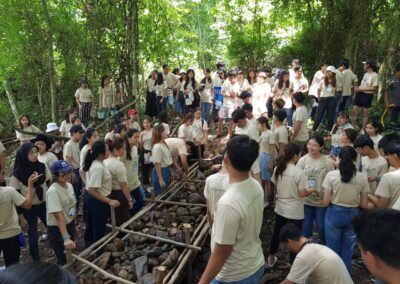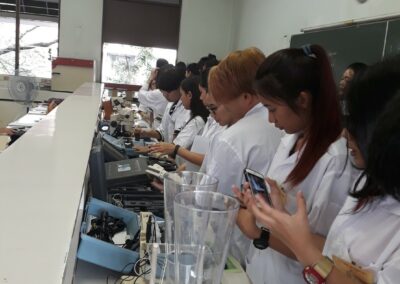Change Language: ภาษาไทย
Bachelor of education
Environmental science
ภาษาไทย ภาคปกติ
ระยะเวลา: 4 ปี
จำนวนรับเข้า: 55 คน
คุณสมบัติผู้สมัครเข้าศึกษา:
- ผู้สมัครต้องเป็นผู้สำเร็จการศึกษาชั้นมัธยมศึกษาปีที่ 6 สายสามัญ กลุ่มสาระการเรียนรู้วิชาวิทยาศาสตร์ ฟิสิกส์ เคมี ชีวะ ต้องเรียนรายวิชาพื้นฐานและรายวิชาเพิ่มเติม รวมกันไม่น้อยกว่า 22 หน่วยกิต กลุ่มสาระการเรียนรู้คณิตศาสตร์ต้องเรียนรายวิชาพื้นฐานและรายวิชาเพิ่มเติม รวมกันไม่น้อยกว่า 12 หน่วยกิต
จำนวนหน่วยกิต:
- จำนวนหน่วยกิต รวมไม่น้อยกว่า 137 หน่วยกิต
- วิชาศึกษาทั่วไป 30 หน่วยกิต
- วิชาเฉพาะ ไม่น้อยกว่า 100 หน่วยกิต
- วิชาเลือกเสรี ไม่น้อยกว่า 6 หน่วยกิต
- ประสบการณ์ภาคสนาม 1 หน่วยกิต
ค่าเล่าเรียน:
- ภาคการศึกษาละ 17,300 บาท (เหมาจ่าย)
สถานที่ศึกษา:
คณะวิทยาศาสตร์และเทคโนโลยี มหาวิทยาลัยธรรมศาสตร์ ศูนย์รังสิต
ติดต่อหลักสูตร:

This department is another outstanding department in the faculty, as it teaches environmental science and environmental management aspects such as air and noise pollution, vibrations, waste management, toxin management, and application of geographic information technology. Upon graduation, students should be able to work in any environmental area, with job guarantees in both the private and public sectors. This is because Thailand is currently seriously in short of environmental personnel, analysts and researchers.
Program Description
The Environmental Science Program has two major subjects as follows:
- Environmental Science and Technology
- Environmental and Natural Resource Management
Specialized subjects are in basic science and entrepreneurial science, with required specialized subjects including foundations in environmental science and learning about ecology, the oceans, soil, forests; air pollution, noise pollution, wastewater, wastes, and industrial wastes.
-
Environmental technology subjects cover learning about geographic information technology, risk assessment, environmental impact assessment techniques, and environmental laws.
-
Environmental management subjects cover learning about mining and art environmental management, climate change and disaster management.
-
Research and ethics subjects cover learning about research procedures and environmental problems, field training and special projects.
Other special elective subjects are also available, including those which offer field experience.
The program strives to produce graduates with knowledge and competence in environmental science and morals and ethics consistent with the mission of the university while meeting national development objectives. Graduates will have initiatives, creativity, reason, morals, ethics, and responsibility while being good members of society who possess knowledge and skills in environmental management in support of the development plans and policies of the economy and society, both of which continue to lack knowledgeable and able environmental researchers and analysts who can work effectively in the public and private sectors. Finally, graduates are required to possess actual knowledge, capabilities and proficiency in environmental subjects with the ability to apply their environmental knowledge in other academic fields as required.
Furthermore, with the boundaries separating knowledge in different sciences gradually breaking down, education without borders is proliferating. For example, leading international universities are giving opportunities for students to learn more across different sciences and are giving less importance to faculties in order to meet the education demands of the 21st century.
Thus, the program was developed with a variety of subjects for students to choose to ensure that students who wish to learn from different faculties to have greater opportunity for learning across different fields.
Internships or Cooperative Education
Students will receive opportunities for internships at leading organizations in the public and private sectors within the country and abroad that are part of the network of the Faculty of Science and Technology (internship takes place during the summer semester of the third year or at the end of the first semester of the fourth year).
Further Studies
Further studies are possible in a Master of Science program in environmental science at the Faculty of Science and Technology of Thammasat University or other leading academic institutions in the country or abroad.
Target Occupations After Graduation
-
Environmental academic
-
Instructor at a public or private organization
-
Researcher or scientist in a public or private organization
-
Government employee or state enterprise employee
-
Private business owner, or business employee such as a scientific equipment
-
Chemical sales person, and freelancer.
“Protect the environment; academics prepare for action, to solve problems for the government and the people.”





